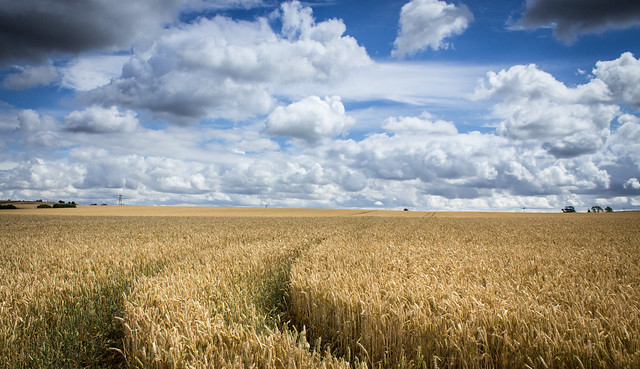The last two mornings, I’ve gotten up early for quiet time
with God before the days burst into full volume. Both mornings, the loud child
has woken up just as I’m settling in with my Bible and warm beverage. It seems
like if I’m making extra effort toward good, holy choices, God might bless me
with quiet, sleepy children.
 |
| Photo Credit: Flickr user stockmonkeys.com |
Pastor Dirk drew our attention to God’s fairness in the
Parable of the Compassionate Employer (Matthew 20:1-16). A vineyard owner (who
represents God in this story) hires workers at the beginning of the day,
agreeing to pay them a fair amount for a day of work; four more times
throughout the day he hires other workers, agreeing to pay them whatever is
right. At the end of the story, the workers all go home with the same pay,
whether they worked one hour or twelve. The workers who were in the field the
longest see the owner’s generosity to others and expect more than they agreed
to; they complain that He is unfair. Two things stand out in particular in this
parable: the compassion and unexpected generosity of the vineyard owner, and
the expectations of the workers.
Whether we look at our own lives (when loud children wake up
at 6:15, or whatever your unfairness might be), or look through the eyes of the
vineyard workers, we might be tempted to claim that God is unfair. Yet the
Bible tells us that God is just, or righteous. How can we reconcile real life
with Truth?
God is just. Justice means rendering to everyone what he is
due. That’s an attribute of God that comforts me when I’m considering wrongs
committed against me or injustice in the world. But I regularly forget what I
am actually due:
“For all have sinned and fall short of the glory of God, and …the
wages of sin is death.” (Romans 3:23, 6:23).
I sin. I deserve death. That’s what I’m due. Death is what’s
fair.
It turns out, I don’t want God to be fair. When I am reminded
of what I am due, I am massively thankful that God is not only just, but He is also
compassionate, merciful and gracious. Fairness alone would demand that I die
and be separated from God forever. But mercy and grace are where I find myself
saved and hidden with God forever!
By His great mercy and costly grace, God made a way to
satisfy justice – to pay the death that my sin owes – and to mercifully offer
me life with Him instead: Jesus is the way. If we believe that Jesus’ death paid
for our sin, we are made right with God and will live with Him eternally!
The vineyard parable offers the stark and needed reminder
that we are not “underpaid,” regardless of our circumstances. The breath in my
lungs is an undeserved gift from God. No actions on my part – even obedient
ones – demand generous rewards; nothing I do earns me more of His favor. Additional
gracious blessings should be just that: unexpected and undemanded, not earned
rewards. God’s perspective is so much different than ours:
“Our God is in heaven; He does whatever pleases him.” Psalm
115:3
God’s grace won’t be constrained by our perception of
fairness.
“What then shall we say? Is God unjust? Not at all! For he
says to Moses, “I will have mercy on whom I have mercy, and I will have
compassion on whom I have compassion.” It does not, therefore, depend on man’s
desire or effort, but on God’s mercy.” Romans 9:14-16
Let’s let our joy in His blessings be full, unhindered by intolerance of
His grace to others.
[Robin Bupp is married to Caleb, and they are from many places east of the Mississippi (but are calling Michigan home for the foreseeable future). A former high school science teacher, Robin is slowly turning the two Bupp kiddos into tiny nerds while they teach her lots of things, especially humility and patience.]


